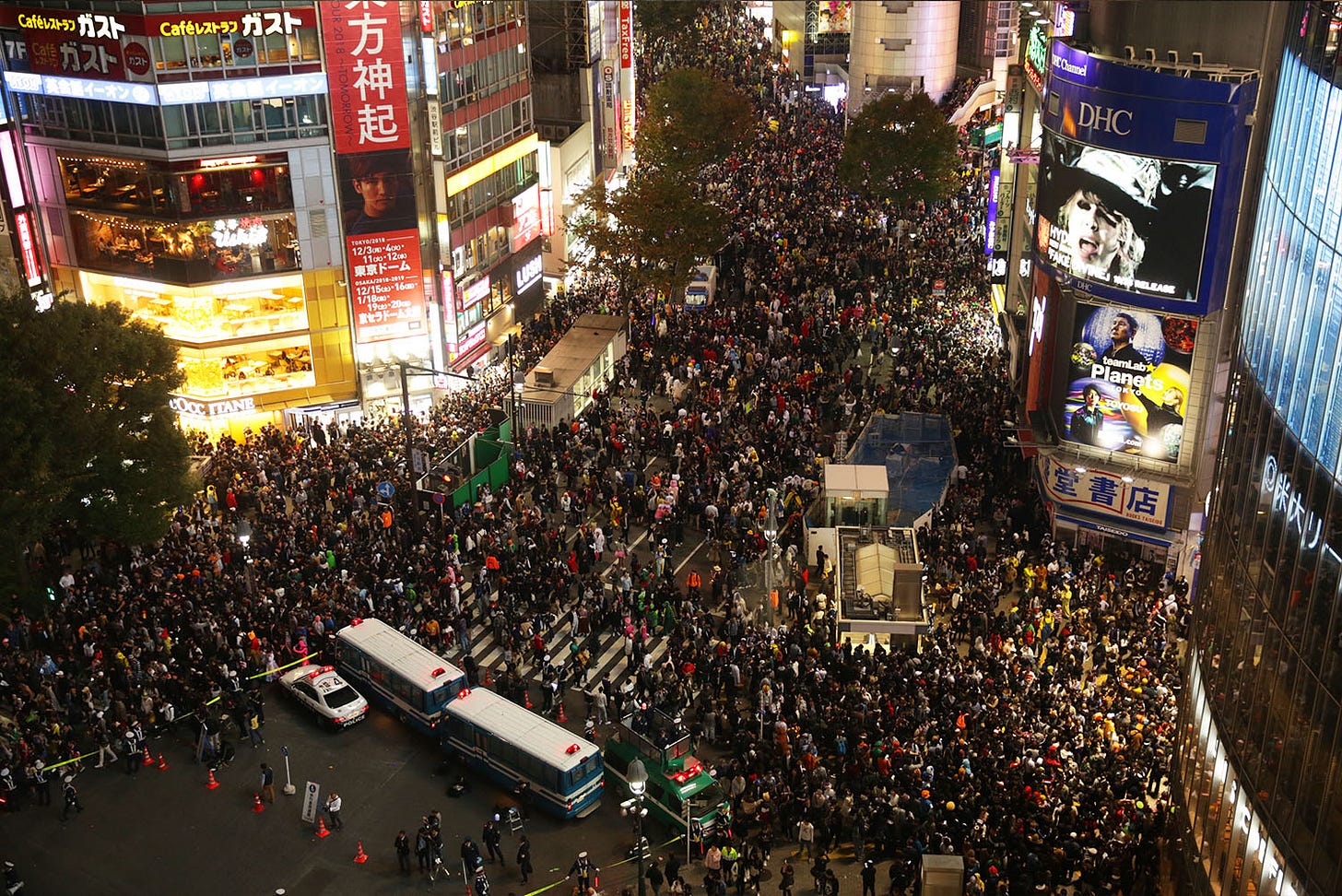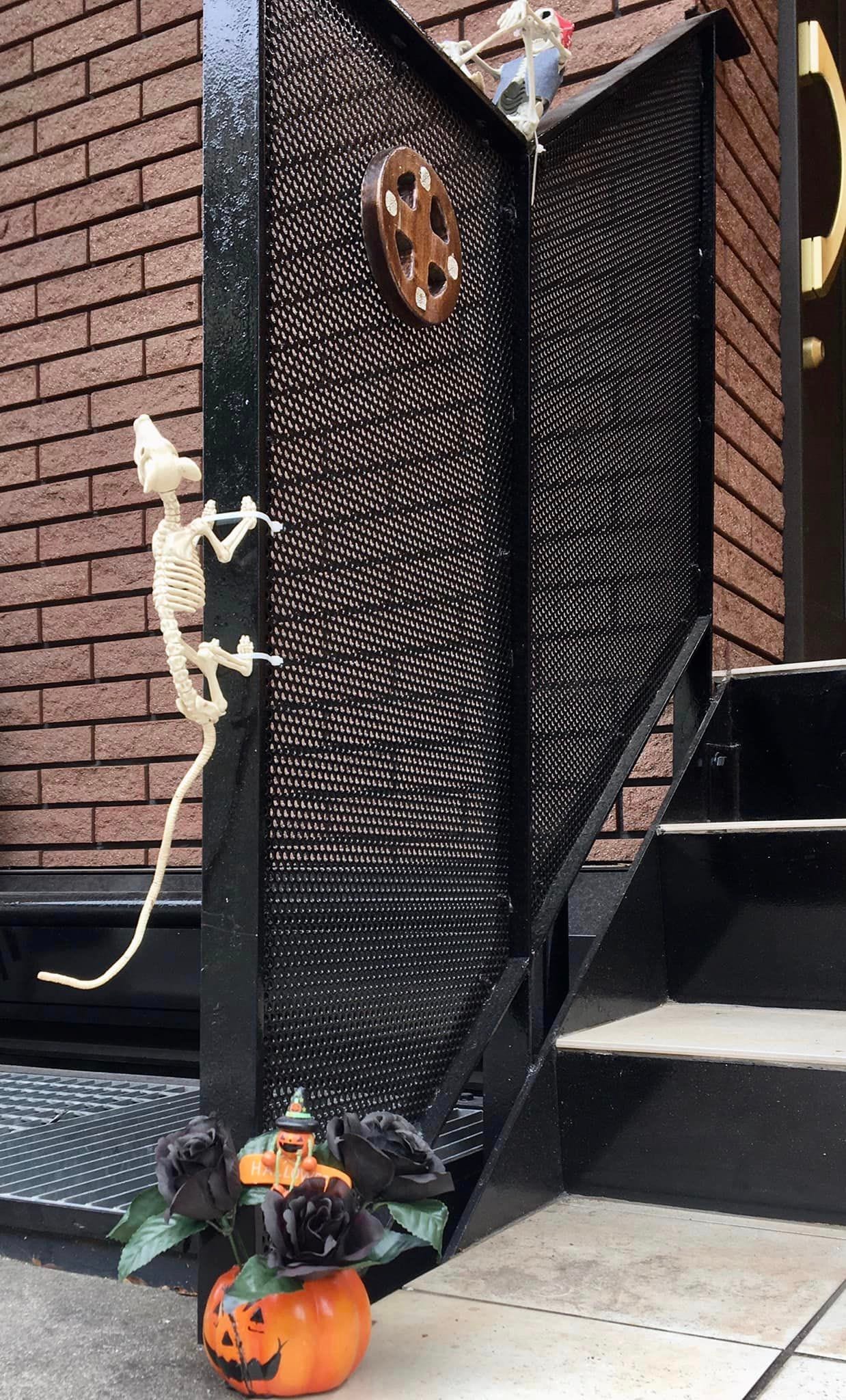Halloween, heaven, and what comes after
The Christian hope of life after death and life after life after death (h/t Tom Wright)
Halloween is a thing in Tokyo now. When I first arrived here 30 years or so ago, it wasn’t. The only people observing the occasion were foreigners, who congregated (I don’t know how they coordinated this in an era before social media) in the tail-end car on one of the trains running on the Yamanote Line looping around the city, a small, never-ending mobile Halloween party involving costumes and booze and very loud and improper festivity.
But now, on several nights surrounding October 31, tens of thousands of costumed Japanese and foreign people flock to Shibuya (the site of the renowned “scramble crossing” above) and wander around in various states of insobriety, doing not very much it seems except for being loud and commenting on one another.
Interestingly, the practice of kids going around their neighborhood saying “trick or treat” and getting buckets full of candy has not caught on. Maybe for the same reason the Japanese hardly ever have large house parties—in Japan, the home is essentially a private space, a walled off retreat from the outside world. More’s the pity. I would love to spend an evening scaring tots and dishing out candy. As it is, I do my level best to frighten the neighborhood preschoolers on their daily stroll past our house with a display that involves a jack-o-lantern and a ghost and skeletal mouse and, this year, hopefully, strange black hands reaching up out of the sewer. I so much look forward to hearing the daily mid-morning chorus of “It’s scary!” followed by the consoling voices of the teachers.
The word Halloween, of course, derives from the “hallowed evening” before All Saints Day on the Christian calendar. But the event it stems from, Samhain, dates back to Celtic culture before the arrival of Christianity. And it was a far cry from dressing up like a princess or pirate or Pikachu and getting candy. People would build bonfires, carve scary faces on pumpkins (originally on turnips), and dress up as ghosts. They did this because, on this night about halfway between the fall equinox and winter solstice, the boundary between this world and the “otherworld” thinned and the spirits of dead kindred would seek to return home but, seeing the terrifying carved faces and ghosts, would be frightened and stay away.
When Christianity came onto the scene, Samhain morphed into All Hallow’s Eve, and went from a frightening bid to escape the grip of death and survive into the winter to a festive celebration. Christianity overturned the way we perceive death. Because sacred scripture assures us that those who die in the Lord, far from being trapped in a shadowy, forlorn otherworld, forever desperate to get back home, are, in fact, blessed.
Jesus was crucified between two criminals. One of them, named Dismas by the Tradition, in his final hour said, “Jesus, remember me when you come into your kingdom” (Luke 23:42). In other words, for whatever reason, Dismas saw something astounding in Jesus and entrusted himself fully to this King whom he perceived would not be overthrown even by death. And the answer Jesus gave was, “Truly, I say to you, today you will be with me”—not in the grave or in some bleak, forsaken otherworld—but “in paradise” (Luke 23:43).
Paradise. This is the hope held out by the Christian faith. When we die, we go home to be with the Lord. On that very day, when we reach the end of our course through this life, we will close our eyes in this world and open our eyes to the eternally new dawn of heaven.
On the night before he hung on cross, at the Last Supper, Jesus spoke to his disciples.
“Let not your hearts be troubled. Believe in God; believe also in me. In my Father’s house are many rooms. If it were not so, would I have told you that I go to prepare a place for you? And if I go and prepare a place for you, I will come again and will take you to myself, that where I am you may be also. And you know the way to where I am going” (John 14:1-4).
One of his disciples, Thomas, in typical fashion had no idea what the Teacher was on about. He said, “Lord, we do not know where you are going. How can we know the way?” (John 14:5). And Jesus answered, “I am the way, and the truth, and the life. No one comes to the Father except through me” (John 14:6).
What kind of place has Jesus prepared for us? What kind of neighborhood will we be moving into, when we traverse the Way that is Christ? The book of Revelation provides us with much rich imagery. We will be surrounded by the most luminous music in heaven. We will be able to gaze upon the splendor of God. We will be drawn into unending worship and praise.
After this I looked, and behold, a great multitude that no one could number, from every nation, from all tribes and peoples and languages, standing before the throne and before the Lamb, clothed in white robes, with palm branches in their hands... They are before the throne of God, and serve him day and night in his temple; and he who sits on the throne will shelter them with his presence. They shall hunger no more, neither thirst anymore; the sun shall not strike them, nor any scorching heat. For the Lamb in the midst of the throne will be their shepherd, and he will guide them to springs of living water, and God will wipe away every tear from their eyes.” (Revelation 7:9, 15-17)
This is the paradise that Jesus promised to the thief Dismas that same day. This is the dwelling that he promises to prepare for us. Of course we don’t relish the thought of dying, or passing through the pain of illness and temporary separation from our loved ones. But we know that Jesus has gone ahead and prepared a place for us. We have a true homeland. On the day we arrive, Christ and all the saints will greet us. And from that day on, there will no longer be any hunger, any tears, any hardship, any strife. We will rest from our labors (Revelation 14:13).
Albeit with a sin-sick mixture of belief and unbelief, I trust that Jesus is indeed the way, the truth, and the life. Like the thief on the cross, I do not plead own righteousness or merit. I simply believe in the unbounded mercy of my heavenly Father, and intend boldly to say to Jesus on that day, “Pleasure to see you, my Lord.”
But the truly amazing thing is to recall what the Bible further teaches: Heaven, or paradise, is not the final stage. Heaven is no more than a stop on the way, as charged with joy as it might be. Beyond heaven, the resurrection awaits. In his glorious, grand design, God’s end game is to create a new heaven and a new earth. “Behold, I make all things new” (Revelation 21:5). When we draw our last breath in this world, we will go home to be with Jesus. And, with Jesus and all the saints, we will wait with joy for the kingdom still to come. And then, we will enter together into the resurrection life:
“But we do not want you to be uninformed, brothers, about those who are asleep, that you may not grieve as others do who have no hope. For since we believe that Jesus died and rose again, even so, through Jesus, God will bring with him those who have fallen asleep. For this we declare to you by a word from the Lord, that we who are alive, who are left until the coming of the Lord, will not precede those who have fallen asleep. For the Lord himself will descend from heaven with a cry of command, with the voice of an archangel, and with the sound of the trumpet of God. And the dead in Christ will rise first. Then we who are alive, who are left, will be caught up together with them in the clouds to meet the Lord in the air, and so we will always be with the Lord.” (1 Thessalonians 4:13-17)
On that Last Day—not ours but His—our souls will receive a new, incorruptible body, and we will inherit an unending life on a renewed earth. The joy we taste now in part through faith will be unimaginably more abundant in heaven, but will only be complete in the resurrection that follows heaven. This is the glorious hope we have been given. Hallelujah!






